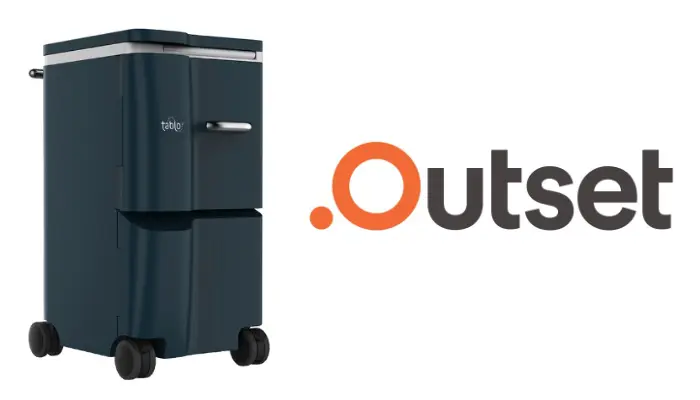Better Care With Tablo
Traditional dialysis is antiquated — it’s disempowering to patients, costly to health systems, cumbersome for nurses, and limiting to physicians. We created #TabloDialysis to change every part of that status quo. And we’re so grateful to our healthcare partners and patients who are taking the lead and showing the way forward. Learn more about our vision for #BetterBeginsNow at outsetmedical.com
Call (818) 342-3012
Primary Services

Nephrologists
We strive to keep our patients connected to their preferred doctors at all times as they are who know their patients best. We value their nephrologists opinions and believe maintaining a strong relationship for coordination of patient care should be a priority

Insurance Providers:
Dialysis is primarily government-funded, with 1% of the federal budget allocated to the treatment of kidney failure and its complications. Patients are covered by Medicare, Medicaid and private insurers. These payers are responsible for patients’ transportation and potential re-hospitalizations. By drastically reducing the rate of infections and hospitalizations, which allows patients to complete rehab, Spectrum Dialysis delivers massive cost savings for government and private insurance payers.

Patient Driven Payment Model:
Thanks to PDPM, a successful dialysis patient is now valuable to a Skilled Nursing Facility (SNF). SNFs are now concentrated on how much they enhance patient outcomes, incentivizing them to take in patients with more complex medical problems, such as dialysis patients. And with our help, their dialysis patients can be successful, promoting a positive cycle that impacts everyone involved in the care process.
Other Services
Increasing Care and Reducing Costs For All
By providing a more effective and gentle treatment within nursing homes: -Patients’ recovery time is reduced from hours or even the whole day to 1 hour. -Rehospitalizations due to dialysis-related causes are reduced by 65%.¹ -Transportation costs to and from clinics are eliminated, saving saving millions of dollars of unnecessary transportation costs.¹
Revolutionizing Every Step
Improving patients’ quality of life is the heart of our mission—and in doing so we’re able to reduce the burden of care for all involved in the dialysis system. Our nurses work with fewer patients than typical dialysis centers, allowing them to focus their attention and build lasting relationships. And with 4 out of 5 of our patients recovering within an hour¹, they feel revitalized and engaged and ready for the therapies awaiting them at the SNIF.
Improvement In Survival
Residents performing more frequent HHD on-site in a SNF have shown improvements in both survival and hospitalizations. More frequent hemodialysis in the general population is associated with: Less risk of cardiovascular hospitalizations Improved post-dialysis recovery time More energy & vitality Reduced antihypertensive medications Improved survival
Difficulties with the contemporary dialysis care model at SNFs have encouraged the developing shift towards a more patient-centric approach.
OPERATIONAL CHALLENGES
The intricate care needed by SNF dialysis residents can result in a multitude of complications between the SNF and the dialysis clinic. When transportation is combined, a three-way challenge manifests itself, raising the likelihood of obstacles, complications and schedule modifications. When a dialysis resident’s schedule is compromised, they may miss meals or scheduled medications, adding another barrier that is detrimental to their health and wellbeing.
CLINICAL CHALLENGES
Dialysis patients who receive traditional off-site in-center dialysis may encounter hemodynamic or cardiovascular instability, commonly associated with longer, conventional hemodialysis treatments. Conventional hemodialysis at a dialysis center may also be associated with longer post-dialysis recovery times and lower energy levels. This can cause dialysis residents to miss meals, rehabilitation, and social activities. In-house dialysis can assist to alleviate the burdens the patients experience.
ECONOMIC CHALLENGES
Round trip transportation is commonly required for Residents being treated at a dialysis center. This includes round-trip transportation three times a week to their clinic. This is a costly and taxing process to go through for the patient and SNFs considering:
• Average roundtrip cost of transportation
• Hours spent scheduling, coordinating, and transporting
SNFs are looking for unique competitive differentiator services to potentially improve occupancy and referrals.
IMPROVING QUALITY OF CARE
Informed, Educated Patients
Dialysis patients who receive traditional off-site in-center dialysis may encounter hemodynamic or cardiovascular instability, commonly associated with longer, conventional hemodialysis treatments. Conventional hemodialysis at a dialysis center may also be associated with longer post-dialysis recovery times and lower energy levels. This can cause dialysis residents to miss meals, rehabilitation, and social activities. In-house dialysis can assist to alleviate the burdens the patients experience.
Customized, Coordinated Care
Many of our patients have multiple health issues that are influenced directly by their kidney care. It is difficult for large outpatient dialysis centers to have daily communication with each patient’s SNF. Our registered nurses, dieticians and social workers work with our patients’ nephrologist and SNF care team to create a customized care plan, with daily face-to-face check-ins to best meet our patients’ unique and comprehensive needs.
TREATMENT ENVIRONMENT
Our primary goal: By striving for gentler treatments, we enable our patients to live with dialysis, not for dialysis.
Our customized treatment: The ability to create and execute a treatment plan customized for the unique needs of the medically complex geriatric patient population is a game-changing specialty.
Our specialized staff: Our comprehensively trained staff provides dialysis in a way that helps patients thrive in the nursing home – this requires knowledge and expertise beyond dialysis and the unique needs of geriatric patient
REDEFINING FLUID MANAGEMENT
We believe administering dialysis 3x per week under conventional methods doesn’t remove enough fluid for geriatrics to have a healthy outcome. The remaining fluid causes the heart to work harder to circulate it, which is a major factor why cardiovascular disease is the leading cause of death (41%) in dialysis patients.¹ Fluid needs to be removed more often and in a gentler manner — and we’ve got outstanding results that prove out our vision.
NURSES WITH A SPECIALIZED SKILL SETS
We believe administering dialysis 3x per week under conventional methods doesn’t remove enough fluid for geriatrics to have a healthy outcome. The remaining fluid causes the heart to work harder to circulate it, which is a major factor why cardiovascular disease is the leading cause of death (41%) in dialysis patients.¹ Fluid needs to be removed more often and in a gentler manner — and we’ve got outstanding results that prove out our vision.

